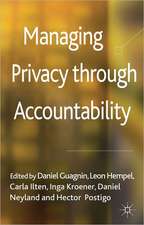Routledge Handbook of Sports Event Management: Routledge International Handbooks
Editat de Milena Parent, Jean-Loup Chappeleten Limba Engleză Hardback – 3 mar 2015
The book adopts a unique stakeholder perspective, structured around the groups and individuals who have an interest in and co-create sports events, including organising committees, promoters, sport organisations, spectators, community groups, sponsors, host governments, the media and NGOs. Each chapter addresses a specific stakeholder, defines that stakeholder and its relationships with sports events, describes the managerial requirements for a successful event, assesses current research and directions for future research, and outlines the normative dimensions of stakeholder engagement (such as sustainability and legacy).
No other book takes such a broad view of sports event management, surveying key theory, current research, best practice, and moral and ethical considerations in one volume. With contributions from leading sport and event scholars from around the world, the Routledge Handbook of Sports Event Management is essential reading for any advanced student, researcher or professional with an interest in sport management, sport development, sport policy or events.
Din seria Routledge International Handbooks
-
 Preț: 371.78 lei
Preț: 371.78 lei -
 Preț: 375.50 lei
Preț: 375.50 lei -
 Preț: 362.19 lei
Preț: 362.19 lei -
 Preț: 352.08 lei
Preț: 352.08 lei - 9%
 Preț: 1487.70 lei
Preț: 1487.70 lei - 5%
 Preț: 317.31 lei
Preț: 317.31 lei -
 Preț: 372.05 lei
Preț: 372.05 lei -
 Preț: 361.19 lei
Preț: 361.19 lei -
 Preț: 390.13 lei
Preț: 390.13 lei -
 Preț: 311.91 lei
Preț: 311.91 lei - 9%
 Preț: 1489.40 lei
Preț: 1489.40 lei -
 Preț: 390.22 lei
Preț: 390.22 lei -
 Preț: 347.74 lei
Preț: 347.74 lei -
 Preț: 347.74 lei
Preț: 347.74 lei - 9%
 Preț: 1490.11 lei
Preț: 1490.11 lei -
 Preț: 356.22 lei
Preț: 356.22 lei -
 Preț: 348.27 lei
Preț: 348.27 lei - 5%
 Preț: 328.11 lei
Preț: 328.11 lei -
 Preț: 394.24 lei
Preț: 394.24 lei - 8%
 Preț: 392.89 lei
Preț: 392.89 lei - 8%
 Preț: 422.42 lei
Preț: 422.42 lei -
 Preț: 357.22 lei
Preț: 357.22 lei - 8%
 Preț: 421.97 lei
Preț: 421.97 lei - 5%
 Preț: 437.80 lei
Preț: 437.80 lei -
 Preț: 341.55 lei
Preț: 341.55 lei - 9%
 Preț: 1651.61 lei
Preț: 1651.61 lei - 9%
 Preț: 1665.66 lei
Preț: 1665.66 lei -
 Preț: 381.91 lei
Preț: 381.91 lei -
 Preț: 350.20 lei
Preț: 350.20 lei -
 Preț: 347.74 lei
Preț: 347.74 lei - 20%
 Preț: 1400.22 lei
Preț: 1400.22 lei -
 Preț: 342.76 lei
Preț: 342.76 lei -
 Preț: 348.17 lei
Preț: 348.17 lei -
 Preț: 345.16 lei
Preț: 345.16 lei -
 Preț: 353.88 lei
Preț: 353.88 lei -
 Preț: 1057.72 lei
Preț: 1057.72 lei -
 Preț: 348.05 lei
Preț: 348.05 lei - 5%
 Preț: 330.12 lei
Preț: 330.12 lei -
 Preț: 358.30 lei
Preț: 358.30 lei - 9%
 Preț: 1528.86 lei
Preț: 1528.86 lei -
 Preț: 346.77 lei
Preț: 346.77 lei -
 Preț: 392.48 lei
Preț: 392.48 lei - 9%
 Preț: 1454.51 lei
Preț: 1454.51 lei - 5%
 Preț: 326.85 lei
Preț: 326.85 lei -
 Preț: 346.11 lei
Preț: 346.11 lei -
 Preț: 361.74 lei
Preț: 361.74 lei - 9%
 Preț: 1349.74 lei
Preț: 1349.74 lei - 19%
 Preț: 422.81 lei
Preț: 422.81 lei - 8%
 Preț: 385.56 lei
Preț: 385.56 lei
Preț: 1358.13 lei
Preț vechi: 1824.22 lei
-26% Nou
Puncte Express: 2037
Preț estimativ în valută:
259.91€ • 268.50$ • 216.31£
259.91€ • 268.50$ • 216.31£
Carte tipărită la comandă
Livrare economică 25 martie-08 aprilie
Preluare comenzi: 021 569.72.76
Specificații
ISBN-13: 9780415858649
ISBN-10: 041585864X
Pagini: 462
Ilustrații: 17
Dimensiuni: 174 x 246 x 30 mm
Greutate: 0.98 kg
Ediția:1
Editura: Taylor & Francis
Colecția Routledge
Seria Routledge International Handbooks
Locul publicării:Oxford, United Kingdom
ISBN-10: 041585864X
Pagini: 462
Ilustrații: 17
Dimensiuni: 174 x 246 x 30 mm
Greutate: 0.98 kg
Ediția:1
Editura: Taylor & Francis
Colecția Routledge
Seria Routledge International Handbooks
Locul publicării:Oxford, United Kingdom
Public țintă
Postgraduate and UndergraduateCuprins
1. The (Wide) World Of Sports Events Section 1: The Organizers 2. The Bidders’ And Promoters’ Perspective 3. The Organizing Committee’s Perspective 4. The Volunteers’ Perspective Section 2: The Sport Organizations 5. The Sport Event Owners’ Perspective 6. The Sport Federations’ Perspective Section 3: The Participants 7. The Athletes’ Perspective 8. Masters Sport Perspectives 9. The Spectators’ Perspective Section 4: The Support 10. The Sport Parents’ And Entourage’s Perspective 11. The Mission Staff Perspective Section 5: The Community 12. The Community’s Perspective 13. The Tourism Agencies And Local Business Actors’ Perspective Section 6: The Funders 14. The Local And Regional Governments’ Perspective 15. The National Government’s Perspective 16. The Sponsors’ Perspective Section 7: The Media 17. The Broadcasters’ Perspective 18. The Written Press And Social/New Media Perspectives Section 8: Other Stakeholders 19. The Security Agencies’ Perspective 20. The Non-Governmental Agency Perspective Section 9: Conclusions 21. Conclusions And Future Directions For Sport Event Management Scholarship
Recenzii
"It is a book by researchers on the state of the art in their field. However, it also makes an effort not just to reflect on the research field but also to be a handbook for the practitioner."
Christian Tolstrup Jensen, University of South-Eastern Norway.
Christian Tolstrup Jensen, University of South-Eastern Norway.
Descriere
Surveying the management of sports events of every size and scale, this new handbook presents key theory, best practice and ethical considerations. The book adopts a unique stakeholder perspective, structured around the groups and individuals who have an interest in sports events, including organising committees, promoters, sport organisations, spectators, community groups, sponsors, host governments, the media and NGOs. Each chapter addresses a specific stakeholder, defines them and their relationships, describes the managerial requirements for a successful event, assesses current research and directions for future research, and outlines the normative dimensions of stakeholder engagement.







